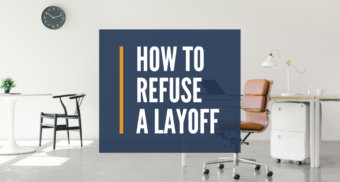British Columbia Employees Laid-off Due to COVID-19 May Now Be Able to Claim Substantial Severance

COVID-19’S IMMEDIATE IMPACT ON CANADIAN EMPLOYEES
In March 2020 the COVID-19 pandemic exploded into Canadian society, quickly reducing economic demand. The resulting impact to Canadian business was swift and catastrophic. Businesses of all sizes immediately reduced their balance sheet liabilities to stave off insolvency and even bankruptcy. In the main, they did so by placing their employees on “temporary” layoff.
Absent contractual agreement, employers have no legal right to temporarily suspend an employee’s employment. Doing so is therefore imposing a new term on that employee’s employment contract. Such imposition requires employee consent. In other words, furloughed employees had to agree to those March layoffs. If they did not, they could claim the employer constructively dismissed them and move to claim severance.
Most Canadian employees accepted the temporary layoffs on the reasonable expectation that the pandemic would be short-lived. They exchanged their right to claim severance for the right to return to their jobs when the pandemic abated. At the time, their logic was sound: the long-term viability of their jobs was more valuable to them than one-time potential severance. As the pandemic dragged on, however, these laid-off employees were left in an economically uncertain (un)employment limbo.
BOTTOM LINE #1: COVID-19 layoffs left many employees uncertain about their employment future, with few economic options.
LAYOFF LAW IN BRITISH COLUMBIA
Temporary layoffs in B.C. are governed by the British Columbia Employment Standards Act, RSBC 1996, C-113 (the “ESA”). Pre-COVID, the ESA prevented employers from laying off their employees for more than 13 weeks out of any 20-week stretch of time. Consequently, an employee laid off for 13 straight weeks was automatically terminated by operation of the ESA.
In approximately June of this year, this 13-week cap to temporary layoffs would have caused the automatic termination of a substantial number of B.C. employees laid off due to COVID-19. At the time, neither employers nor employees hoping to get their good jobs back wanted this tsunami of terminations to occur. So the B.C. Provincial Government extended the temporary layoff period, first to 16 weeks and then to a maximum of the earlier of 24 weeks or August 30, 2020 (section 45.01 of the British Columbia Employment Standards Regulation, B.C. Reg 369/95 [the “Regulation”]).
Unfortunately, extending the temporary layoff period until August 30 simply kicked the termination can down the road. Though some laid off British Columbians were recalled to work or found alternative employment in the interim, many remained in anxious economic limbo: no job, no certainty as to when or if their employer would recall them to work, and no option to claim severance.
BOTTOM LINE #2: for many B.C. employees, COVID-19 layoff uncertainty continued for over six months.
SEVERANCE AT LAST
Enter August 30, 2020. Provided that their employer did not receive a government-granted variance to extend their temporary layoff for a tailored amount of time, the employment of most furloughed B.C. employees was technically terminated by operation of law on August 30. This automatic termination allowed laid off B.C. employees, finally, to claim severance from their employers. Crucially, section 63(5) of the ESA backdates the date of this automatic employee termination to the start of the temporary COVID-19 layoff.
Practically, this backdating provides furloughed employees entitled to common law notice the ability to claim up to seven months of severance, even if their employers offered to re-employ them after August 30.
Triggering termination and claiming severance in B.C. has proven to be an attractive option for many employees worried about the long-term solvency of their employers, or who simply want to move on from long-term employers who put them last during the pandemic.
Many laid-off B.C. employees are simply not aware that section 45.01 of the Regulation may have automatically triggered their termination, allowing them to claim severance. Fewer still are aware that such severance is backdated to the start of their layoff such that their severance entitlement may already be substantial.
If your B.C. COVID-19 layoff extended through August 30, you should speak to a B.C. employment lawyer to determine if you have the option of claiming substantial severance from your employer.




